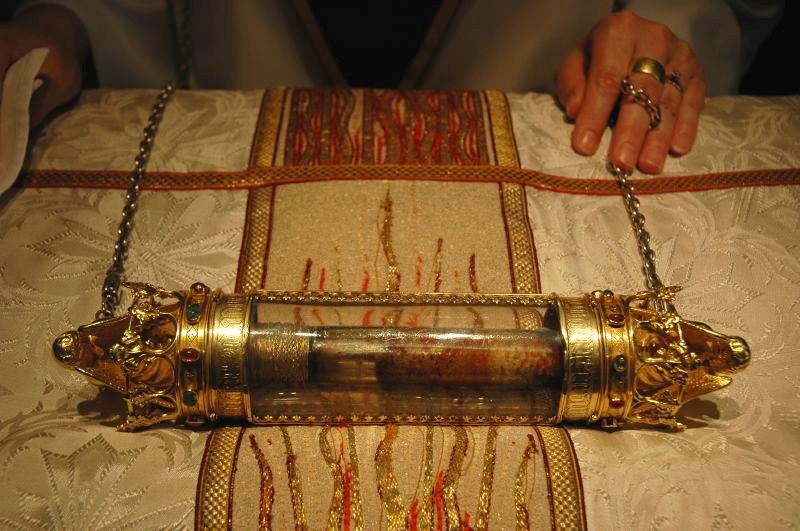a poor fund of knowledge ... much like any other incident of malpracticeThen what other slant is there for priests and pastors who beat and bash their church members in an exorcism?
If they have clients other than their gods it should be obvious ....What political slant is there for witch doctors to kidnap children in Uganda and kill them in sacrificial offerings to their Gods for their clients?
so what is it?Individuals will act according to their wishes and their own motivations and some of those individuals will find religious motivation to do something inherently bad, even though millions of others do not find the same motivation from that particular religion. The person committing the act of violence is still religiously motivated. Ergo, it is still religious motivation for that individual.
their own wishes or religious motivation?
I don't think its possible to adhere to provincial politics and the absolute truthAnd?
The motivation for those individuals is still religious, even if it is mixed with political overtones.
Actions which may be in part political, violence with political overtones, where the perpetrator finds reason for his/her actions in their religious beliefs and what they believe as the "absolute truth" in their religious beliefs which for them, motivated them to commit the act.. that is religious motivation, even if other factors were also motivators.. It does not make their religious motivation any less real.
I'll give you an example:
To get things started it took only ordinary religious belief, nothing all that uncommon in America today. It took Jones, with his fundamentalist belief that the creator of the universe relayed Absolute Truth to ancient prophets who then memorialized that Absolute Truth in literal form in what we now call the Bible. Such beliefs alone, of course, usually don't result in direct acts of violence or even much controversy.
In his unique understanding of scripture, however, Jones interpreted biblical truth as justifying, if not requiring, him to lead his followers in the act of insulting Muslims by burning the Koran. As such, the chain of irrationality was underway.
To continue the chain, we must go to the other side of the world where once again we find common, ordinary religious beliefs, nothing that would usually be considered inherently dangerous. We find the Afghans, with their fundamentalist belief that the creator of the universe relayed Absolute Truth to another prophet, Muhammad, who then memorialized that Absolute Truth in literal form in what we now call the Koran. Although these religious beliefs alone would normally be considered benign, the actions of the mobs certainly were not. Having heard about the disrespectful burning by Jones of their holy book, some of the Afghans felt justified, if not obliged, in reacting with violence and slaughter.
A secularist might be tempted, in the face of these events, to make a broad indictment of all religion, but to be fair we must acknowledge that such a reaction would be overly simplistic. Events such as these, when analyzed thoroughly, can usually be understood as resulting from complex factors of sociology, psychology, culture, and even economics. Surely, to place all the blame on religion alone would be hasty.
Nevertheless, just as it would be wrong to simplistically attribute the violence entirely to religion, it would be similarly inappropriate to deny the obvious religious connection. Any objective assessment, not just of these events but of religion itself, must seriously ponder the chain of causation that so often leads from religion to irrational violence.
Notice how the author of this article establishes a multiple array of causes and then concludes that religion often leads to irrational violence
You mean the one that says there is sociology, psychology, culture, and even economics ... but when it becomes religious it suddenly becomes often and irrational?Pay particular attention to that last paragraph. That is what you seem to be denying.
it means the religious motivation is a superficial dressing of more telling factors.Which does not mean that religious motivation was not also a factor in the conflict.
it means that without the more telling factors, the conflict cannot take placeJust because there were other motivators does not mean that the religious compoment does not exist.
as opposed to what?Your stance would be akin to saying that the violence and hatred between Jews and Muslims in Israel has nothing to do with religion at all.
the occupation of land?
for what?The religious motivation is still there.
violence or malpractice?
T
In this case it is localized to individuals under the sway of a particular charismatic leaderhe point about religious motivation is that it is localised. It is individual.
I am rejecting it because there are more accurate and telling motivational forces at work.You seem to be rejecting religion as a motivator for individuals because it is not on a large scale.
the scale helps isolate the proper cause.The scale is irrelevant LG.
For instance if you have two communities of two different religious slants that have not engaged in violence for many hundreds for years and then suddenly it heats up, you can weigh in the scale to help establish what is really at play



